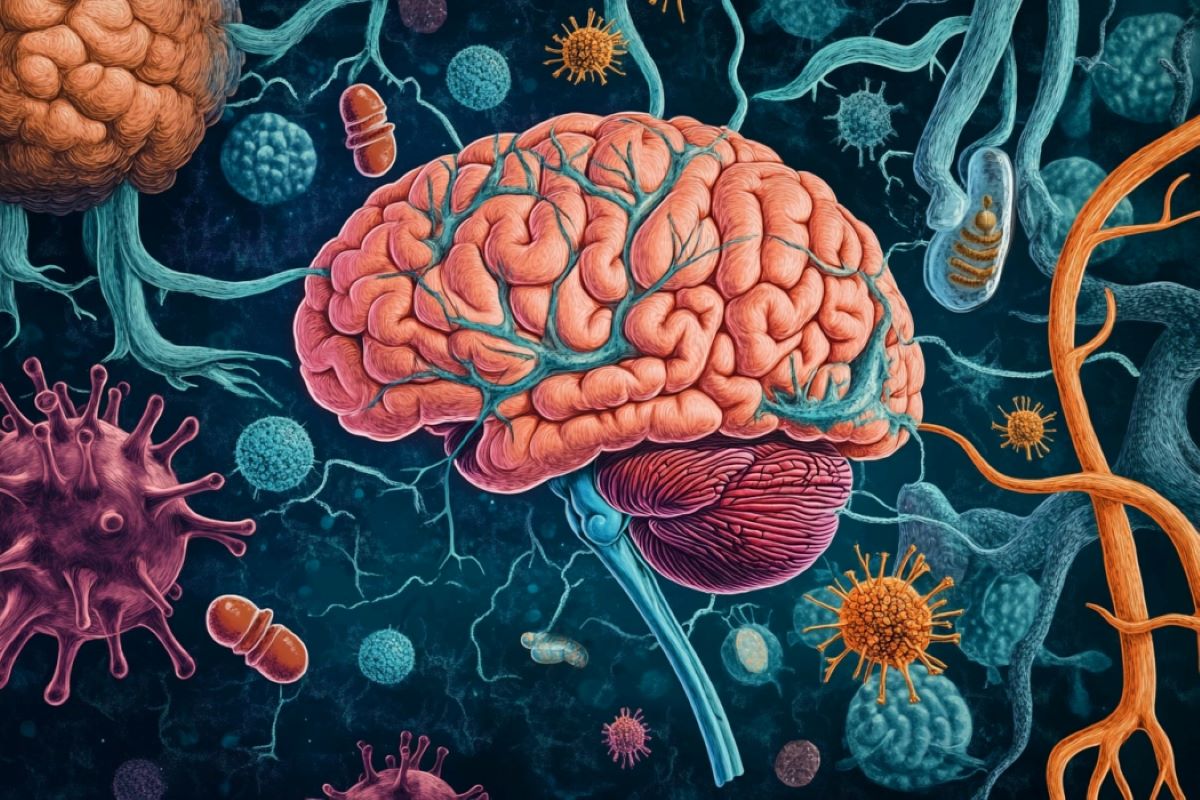Summary: Researchers found that mutations in the Sox3 gene cause hypopituitarism, a condition where the pituitary gland produces insufficient hormones, leading to growth issues and infertility. In a study on mice, they discovered that Sox3 mutations affect brain cells called NG2 glia, which are essential for hormone production.
Treating the mice with aspirin or altering their gut microbiome restored NG2 glia levels and reversed hypopituitarism. These findings suggest that both aspirin and gut bacteria could be explored as potential treatments for people with Sox3 mutations or other hormone-related disorders.
Key Facts:
- Sox3 mutations lead to hypopituitarism by affecting NG2 glia cells in the brain.
- Aspirin treatment restored NG2 glia levels and reversed hormonal deficiencies in mice.
- Changes in the gut microbiome protected mice from hypopituitarism symptoms.
Source: Francis Crick Institute
People with mutations in a gene called Sox3 develop hypopituitarism, where the pituitary gland doesn’t make enough hormones. It can result in growth problems, infertility and poor responses of the body to stress.
In research published today in PLOS Genetics, the scientists at the Crick removed Sox3 from mice, causing them to develop hypopituitarism around the time of weaning (starting to eat solid food).
They found that mutations in Sox3 largely affect the hypothalamus in the brain, which instructs the pituitary gland to release hormones. However, the gene is normally active in several brain cell types, so the first task was to ask which specific cells were most affected by its absence.
The scientists observed a reduced number of cells called NG2 glia, suggesting that these play a critical role in inducing the pituitary gland cells to mature around weaning, which was not known previously. This could explain the associated impact on hormone production.
The team then treated the mice with a low dose of aspirin for 21 days. This caused the number of NG2 glia in the hypothalamus to increase and reversed the symptoms of hypopituitarism in the mice.
Although it’s not yet clear how aspirin had this effect, the findings suggest that it could be explored as a potential treatment for people with Sox3 mutations or other situations where the NG2 glia are compromised.
An incidental discovery revealed the role of gut bacteria in hormone production
When the National Institute for Medical Research (NIMR) merged with the Crick in 2015, mouse embryos were transferred from the former building to the latter, and this included the mice with Sox3 mutations.
When these mice reached the weaning stage at the Crick, the researchers were surprised to find that they no longer had the expected hormonal deficiencies.
After exploring a number of possible causes, lead author Christophe Galichet compared the microbiome – bacteria, fungi and viruses that live in the gut – in the mice from the Crick and mice from the NIMR, observing several differences in its makeup and diversity. This could have been due to the change in diet, water environment, or other factors that accompanied the relocation.
He also examined the number of NG2 glia in the Crick mice, finding that these were also at normal levels, suggesting that the Crick-fed microbiome was somehow protective against hypopituitarism.
To confirm this theory, Christophe transplanted faecal matter retained from NIMR mice into Crick mice, observing that the Crick mice once again showed symptoms of hypopituitarism and had lower numbers of NG2 glia.
Although the exact mechanism is unknown, the scientists conclude that the make-up of the gut microbiome is an example of an important environmental factor having a significant influence on the consequences of a genetic mutation, in this case influencing the function of the hypothalamus and pituitary gland.
Christophe Galichet, former Senior Laboratory Research Scientist at the Crick and now Research Operations Manager at the Sainsbury Wellcome Centre, said: “It was a huge surprise to find that changes in the gut microbiome reversed hypopituitarism in the mice without Sox3. It’s reinforced to me how important it is to be aware of all variable factors, including the microbiome, when working with animals in research and how nurture can influence nature.”
Robin Lovell-Badge, Group Leader of the Stem Cell Biology and Developmental Genetics Laboratory at the Crick, said: “Hypopituitarism can result from trauma as well as rare mutations, and it can have some profound effects on health in general. As well as suggesting potential options for treatment, our work reinforces how important the gut-brain link is.
“The next step for this research will be to work out exactly how aspirin and the microbiome influence NG2 glia, and then study this effect in people so we can see if these relatively accessible interventions could help treat hypopituitarism.”
About this microbiome and genetics research news
Author: Clare Green
Source: Francis Crick Institute
Contact: Clare Green – Francis Crick Institute
Image: The image is credited to Neuroscience News
Original Research: Open access.
“Sox3-null hypopituitarism depends on median eminence NG2-glia and is influenced by aspirin and gut microbiota” by Christophe Galichet et al. PLOS Genetics
Abstract
Sox3-null hypopituitarism depends on median eminence NG2-glia and is influenced by aspirin and gut microbiota
The median eminence (ME), located at the base of the hypothalamus, is an essential centre of information exchange between the brain and the pituitary. We and others previously showed that mutations and duplications affecting the transcription factor SOX3/Sox3 result in hypopituitarism, and this is likely of hypothalamic origin.
We demonstrate here that the absence of Sox3 predominantly affects the ME with phenotypes that first occur in juvenile animals, despite the embryonic onset of SOX3 expression. In the pituitary, reduction in hormone levels correlates with a lack of endocrine cell maturation.
In parallel, ME NG2-glia renewal and oligodendrocytic differentiation potential are affected. We further show that low-dose aspirin treatment, which is known to affect NG2-glia, or changes in gut microbiota, rescue both proliferative defects and hypopituitarism in Sox3 mutants.
Our study highlights a central role of NG2-glia for ME function during a transitional period of post-natal development and indicates their sensitivity to extrinsic signals.







